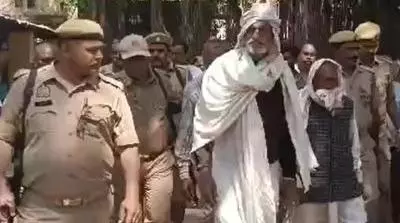
3 get death penalty 44 years after 24 Dalits were killed in UP massacre
text_fieldsPhoto: Videograb from X
New Delhi: A court in Uttar Pradesh's Mainpuri district has sentenced three men to death for the brutal murder of 24 Dalits, including women and children, 44 years ago in what became known as the Dehuli massacre. "...They targeted and killed as many Jatavs as they could find," the court stated in its judgement on Tuesday (March 18).
While sentencing the three remaining accused, special judge Indira Singh (dacoity and affected areas) stated that the crime brought dishonour to both humanity and the legal system.
“It is a crime which falls in the category of destroying the social structure,” said Judge Singh, noting that the murders were committed “as a result of deep-rooted caste prejudice” by the dominant Thakurs against the Dalit Jatavs.
She further stated that none of the condemned individuals showed any remorse for their actions. It should be mentioned that after conducting the Dalit slaughter, which lasted more than two hours, the accused did not attempt to flee the area. Instead, they ate leisurely at the houses of some local Thakurs.
‘After carrying out dance of death, accused ate food’
“After carrying out this dance of death for two-and-a-half hours, the accused ate food in the same village with full respect, which shows that they did not have any kind of remorse or regret for their crime and they had carried out this incident in a planned manner as part of a conspiracy,” said judge Singh.
The court found Rampal Singh, Ram Sewak, and Kaptan Singh guilty of a criminal conspiracy and the mass murder of 24 Dalits in Dehuli village (now part of Firozabad), on November 18, 1981.
A total of 17 accused persons went to trial, 13 of them died before the case was completed, and one absconded. On that fateful day in 1981, a gang of roughly 20-21 men, largely from the dominant Thakur caste, assaulted the Jatav (Dalit) area of Dehuli village, equipped with rifles, firearms, and country-made pistols, and dressed in police khakis, opening fire.
They arrived from the south-east of the village about 4-5 p.m. and opened fire on Dalits, as well as breaking into some homes and shooting people. They also looted many residences. The gunfire injured six people, including two female newborns.
According to the case details, Thakurs harboured a grudge against some Dalits in the area as four Dalit men had stood as witnesses when two Thakur men were detained with guns during an encounter with police roughly 15 months before the killing. The court found that members of the Thakur group perpetrated the crime in order to teach the Jatavs a lesson and instil "panic, terror, and fear" in them.
Judge Singh described the killings of defenceless Dalits, including young men and women, as "cold-blooded murder.”
‘Rarest of the rare’ crime
“If the court shows leniency in such brutal, cruel and barbaric crimes, then it will be injustice to society and humanity,” said Judge Singh, awarding the three surviving accused persons punishment to be hanged till death. She described it as a “rarest of the rare” crime.
“As per the statement given by the witnesses during the trial, after hearing the sound of the gunshots, the women did not hide in their homes to save their lives but pleaded with these people with folded hands to spare their children, but these people did not show any mercy to anyone, whether it was a man, a woman, minors or children,” said the court.
The accused merited the death penalty even though they had no criminal history considering the “exceptional brutality of the crime, the callous manner in which it was committed and the blatant disregard for human life,” said Judge Singh, the Wire reported.
The judge further contextualised the nature of the crime by viewing it through the ideas of caste-based superiority.
“In the year 1981, when scientific advancements in the form of computers and genetics were taking place in the world, some people were stuck with the ingrained and archaic belief that they are superior only because they were born in a particular caste and therefore no one has the right to go against them. This mindset has remained in the modern era that individuals can despise the dignity of others born in so-called ‘lower’ castes without any adverse consequences,” said Judge Singh.
The judge also noted the accused persons' lack of remorse. She claimed that convict Ram Sewak boasted about his Kshatriya heritage and declared that history will speak for itself. None of the convicts showed any remorse, and their behaviour was arrogant and proud as if they had done nothing wrong, according to Judge Singh.






